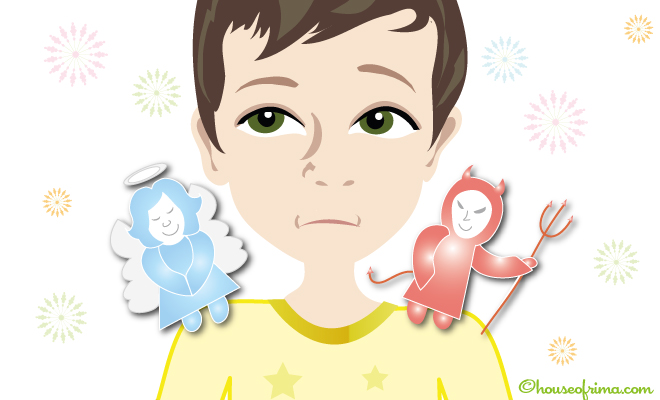“Half a truth is
often a great lie.” – Benjamin Franklin
The other morning I
got up at 6 a.m., but my children were way ahead of me. Stealthily
quiet, they greeted me in the kitchen with surprised and
not-so-innocent smiles. A stool was placed suspiciously close to the
out-of-reach cabinet of special treats. I figured I’d come in just
in time before one of them fell, or their mission was successful and
I would’ve found them with mouths stuffed with marshmallows.
“Were you either of you climbing on
the stool?” I asked.
“No,” Sienna said.
Alessio stood silent, then began
inching his way toward the couch and other subjects. I’m pretty
sleepy before my morning cup. Until then, I hadn’t noticed that
their mission had been half successful. Above my head, the treat
cabinet door was open.
“Alessio! You lied,” I said.
“No I didn’t. Sienna did.”
“But you didn’t tell the truth.
You let her lie and me believe it.” My kids are only three and
four. How could they be so smooth? I appreciate sibling teamwork,
but not when it comes to lying.
Toddler truthiness is as squidgy as
adult truthiness, which is to say that we all lie to varying degrees
and more often than we think. Most adults lie 1-2 times a day.
(http://www.psychologytoday.com/articles/199704/the-truth-about-lying).
Dr. Kang Lee, a developmental
psychologist at Toronto University, has been studying lying in
children for 20 years. His findings may surprise you: Lying is part
of healthy child development. It requires complex thinking skills.
Most of our social interactions require a certain amount of diplomacy
that knows when to be frank, when to offer almost the truth,
and when to stay silent.
Children begin to lie at about 2 ½ – 3
years old. By 7 years of age, almost 100% of children lie to cover
up transgressions. Most children have learned that some lies are
okay, others are not. Often by watching their parents.
All parents try to teach their children
social politeness, or what I call “kind lying” – which means
when Mommy’s friend asks, “How do you like my new hairstyle?”
don’t blurt out, “Yuck. I thought it was a hat.” “Try to
find something good to say,” many a parent has advised their kids,
turning out such gems as: “That’s the best worst pie I’ve ever
had.”
My father is a born storyteller,
Texas-style. One morning, he was trying to get the kids to eat their
breakfast, but they didn’t want to. He explained that if they want
to grow as tall as he is, they need to eat good healthy food,
especially at breakfast. Their ears began to perk up, but not
enough. So he added a dramatic touch. “And if you don’t eat
your breakfast, your body won’t have enough food to grow, and you
will get smaller and smaller until you’re teeny tiny like a baby
again.” Shades of Benjamin Button, it did the trick. Their plates
were clean, lickety split.
Inventive playfulness, making a game of
things, can work beautifully when done in balance. Later, I sat the
kids down and explained that Papa Joe was only joking about them
shrinking as tiny as babies, but not joking about how healthy eating
helps you grow big.
George Washington and the Cherry
Tree. It’s ironic that this story about telling the truth is
actually a lie. Most historians believe it never happened. Still,
the anecdote has been a truthy inspiration for 200 years. When
George was about six years old, he cut down his father’s favorite
cherry tree. When his father confronted him, George said, “I
cannot tell a lie. I did it.” To which George’s dad responded,
“Your honesty is worth more than a thousand cherry trees.”
George became a hero by telling the truth, even when he had done
something wrong.
In Dr. Lee’s studies, children
responded more favorably to the Cherry Tree lesson than to “The Boy
Who Cried Wolf,” which ends with severe punishment for the liar.
Believe it or not, Aesop’s fable actually made children more likely
to lie. Children connected lying with punishment, and so kids just
got better at hiding their lying, rather than learning to tell the
truth.
A Few Truthful
Tips
-
Never punish
your child for telling the truth, even if he/she has done
something wrong. Otherwise, your child will learn that hiding the
truth, not honesty, is the best policy. That said, in an
appropriate and calm manner, attend to the wrong doing separately. -
If you
promise you won’t get mad if they tell you the truth, don’t get
mad (no matter how mad you might be). So your five-year-old has
flushed your wallet down the toilet and is brave enough to tell you.
This is tricky, but it’s even more tricky if your kids see that
you have lied to them about your promise. -
Praise them
when they do it right! As with teaching any value, positive
reinforcement works better than criticism. Notice when your
children have had the courage to tell the truth and praise them for
it.
Ciao,
Princess Ivana





